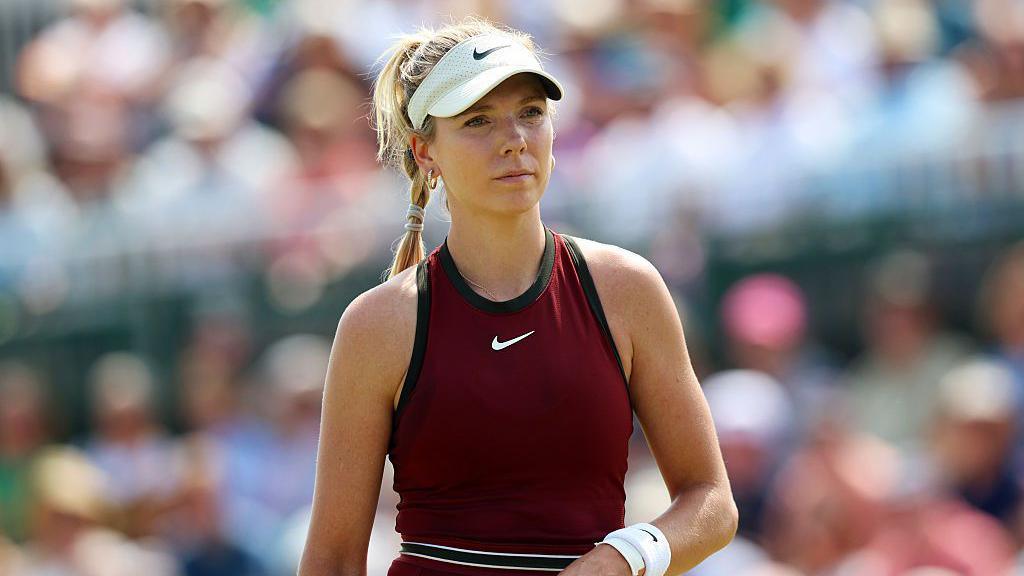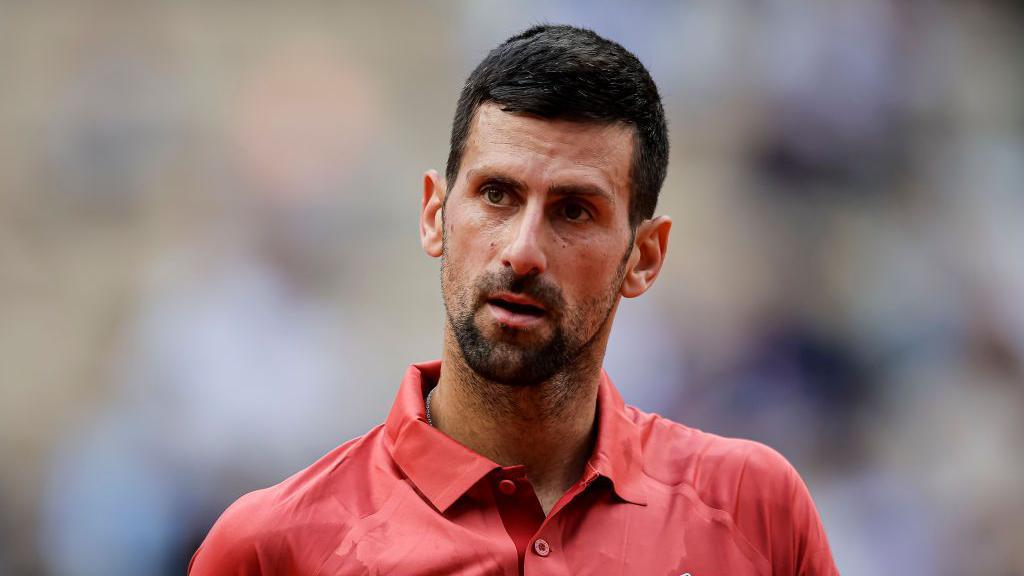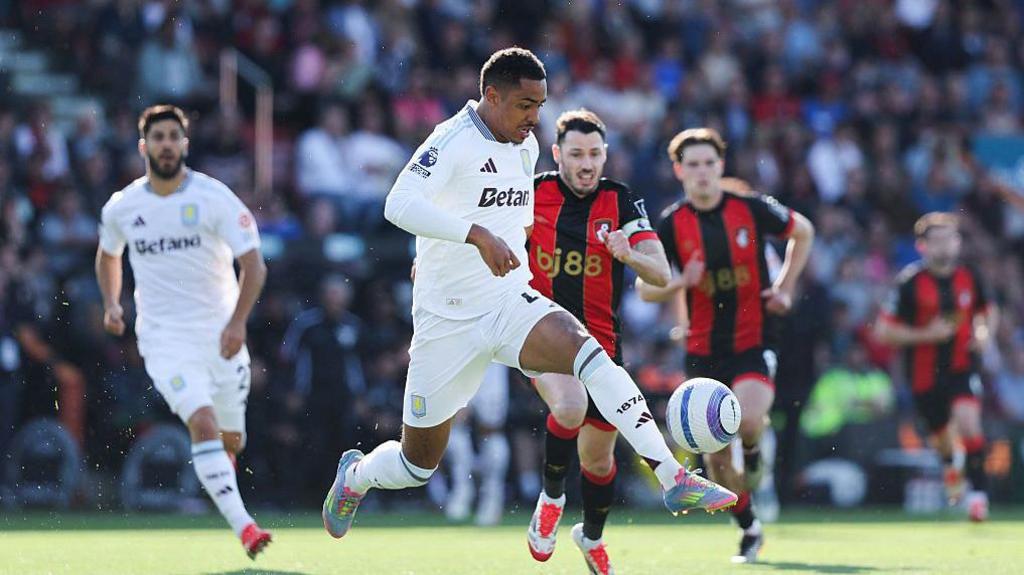Gambling and social media abuse of women in sport - what is going on?

Katie Boulter says gambling plays a significant role in the abuse she receives
- Published
When tennis player Katie Boulter revealed to the BBC the shocking scale of abuse she receives on social media, she emphasised that many angry messages feature references to gambling.
According to Signify, which has been working with tennis authorities on detecting abuse through an artificial intelligence-led detection system called Threat Matrix, a significant proportion of abuse sent to tennis players stems from gamblers who have lost bets.
Across the year, a category they call 'angry gamblers' sent 40% of all detected abuse, with messages clearly related to betting activity because of the timing or content of the abuse.
Asked for a response, a Betting and Gaming Council spokesperson said its members "do not tolerate abuse on social media, which has no place in betting or sport".
It added: "It is vital social media companies take swift action against users, and remove offensive content."
BBC Sport has looked at what exactly is going on with the relationship between gambling, tennis, women in sport and online abuse.
What do we know about gambling in tennis?
Tennis tournaments are played all around the world throughout most of the year, making it one of the most popular sports for regular gamblers to bet on.
A source at one of the world's largest multi-platform gambling operators told the BBC that more than £100m is bet on tennis matches worldwide each day.
The spread of bets is roughly even across men's and women's tennis, tipped slightly higher in favour of the men's game because more matches take place on its Challenger tour, according to this source.
In the United Kingdom, 13% of all sports betters gambled on tennis in 2023, meaning the sport ranked fifth behind horse racing, football, golf and boxing, according to a YouGov survey, external.
But 16% of tennis gamblers spend over £200 per month on bets, according to the data, and 34% of them use websites which offer loyalty schemes for regular customers. That means some UK tennis gamblers spend big and spend regularly, meaning the stakes are higher when they lose.
That perhaps provides an indication as to why the abuse Boulter and other players suffer is so often focused around betting.
Signify work with around 30 players on moderating their private messages, and the proportion of abuse that comes from 'angry gamblers' is 77%.
How does tennis handle gambling sponsorships?
As is the case with other sports, the relationship between tennis and gambling has been a source of controversy for many years.
Concerns over potential match-fixing and ethics have historically led to a reluctance to form official partnerships.
But betting sponsorships have become highly lucrative as gambling has moved online. In an era where high-profile players have campaigned for more prize money and a greater share of sponsor revenue, tennis has begun to demonstrate an increased willingness to work with gambling sponsors.
In 2023, 24-time Grand Slam winner Novak Djokovic said players should be given a higher proportion of the revenue generated from gambling sponsorships in tennis.
"Personally, I probably would not get a betting sponsor on my sleeve but I know that probably 95+% of the players would do that," Djokovic said. "I would support that, but if that's not allowed then what we would deserve to have is 50% of the share that the tournament gets from these sponsorship deals with betting companies."

Novak Djokovic believes players should make more from tennis' gambling partnerships
In February, the International Tennis Federation (ITF) announced an extension of a deal with Stake - the Curacao-based gambling company which also sponsors sports teams including the Sauber Formula 1 team, and Everton - making it the official betting partner of the Davis Cup and Billie Jean King Cup.
Stake was subsequently found to have broken UK Gambling Commission rules by using pornographic content to promote gambling to young people, and abandoned its licence to operate in the UK.
Stake's ITF deal remains in place, and tennis' governing body said in a statement to the BBC: "The ITF partners with a variety of brands from a range of sectors to support our events and tours and 90% of our revenue is reinvested back into the global development of the game.
"All partnerships are rigorously vetted and involve only regulated parties wherever this is relevant."
The Madrid Open, the Miami Open and Swedish Open are now sponsored by South Africa-based Betway.
In 2023, the Women's Tennis Association (WTA) signed a multi-year agreement with online gaming company FanDuel Group, applying to the Tour in North, South and Central America.
The WTA also sells its data to the company Stats Perform, the ATP to Sportradar and the ITF to Infront, for them to distribute to licenced betting operators.
The decision to sell rights in this way was to ensure betting was regulated, replacing the unregulated world of 'courtsiders'.
What about women and gambling?
Historically, men have represented the majority of gamblers in the UK, but data shows that the proportion of women is increasing.
UK Gambling Commission (UKGC) data, external from 2022 found that 42% of women had gambled in the previous four weeks, and that those aged 35 to 54 were most likely to gamble.
Those figures also include non-sports forms of gambling like casinos, slot machines and online bingo, but women are targeted by sports betting platforms too.
A 2024 survey conducted by Stats Perform found that 44% of betting operators said that they want to grow their number of female customers.
In the USA, meanwhile, investment bank Morgan Stanley estimates that 32% of sports betters are now women.
Flutter, the gambling operator which runs Paddy Power, said that 24% of all bets placed through its FanDuel brand during the 2024 Olympic Games in Paris were on women's events, with 60% of football bets placed on women's matches and 79% of gymnastics bets on women's events.
How much is the UK gambling industry worth?
According to the UKGC's latest figures, gambling firms earned revenue of £15.6bn between April 2023 and March 2024, an increase of £0.5bn on the previous year.
That means the UK gambling industry is worth more than double the UK music industry (valued at £7.6bn according to UK Music) and video games industry (valued at £7bn according to Equity, the performing arts and entertainment trade union).
According to estimates, UK gambling companies spent more than £1.5bn on marketing in recent years, with a large portion of that going to television adverts. This rises to closer to £2bn when sponsorships are factored in.
The Office for Health Improvement and Disparities estimates that there are between 117 and 496 gambling-related suicides, external every year in England.

From the summer of 2026 onwards, Premier League football teams have agreed to no longer wear betting company logos on the front of their shirts
Have any new gambling regulations come into effect?
There has been a tightening of regulations in recent years in relation to gambling's marketing and sponsorship in relation to sport. They include:
The whistle-to-whistle ban on gambling advertisements in football, which was implemented in 2019, prohibiting pre-watershed gambling advertising on TV from five minutes before kick-off until five minutes after full-time
A 2022 update to a rule on appealing to children – prior to the change, gambling adverts could not have "particular" appeal to children, whereas now they cannot have "strong" appeal to children
Late last year the government announced new plans, including a levy to generate £100m for the research, prevention and treatment of gambling harms, and online slot stake limits of £5 for over 25s and £2 for young adults aged 18 to 24.
In May the Health and Social Care Committee set out further measures they want the UK government to take in order to better protect people from the possible harms from gambling.
The measures requested include strengthening rules on advertising, taking a risk-based approach to regulation, and to develop a public information campaign addressing the risk of gambling-related suicides.